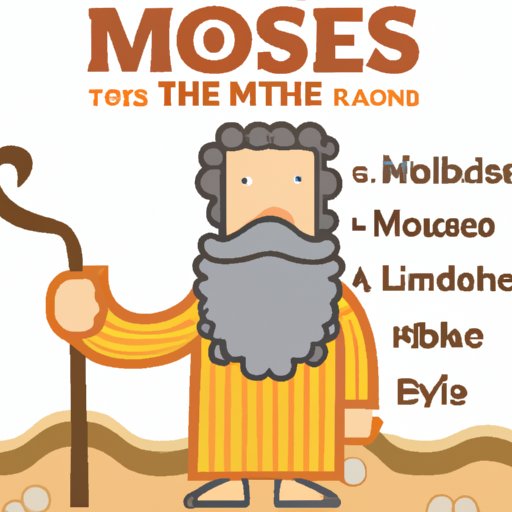Introduction
The story of Moses is one of the most well-known in the Bible. He was a leader of the Hebrews who led them out of slavery in Egypt and across the Red Sea. But was Moses a good leader? This article will explore this question by examining his leadership style, analyzing his leadership qualities, comparing him to other biblical leaders, and re-examining his legacy through modern eyes.
Examining Moses’ Leadership Style and Impact on His Followers
Moses was a charismatic leader who inspired loyalty and devotion from his followers. He had a strong sense of justice and morality, and he was deeply committed to his mission. He was also a visionary leader who could see beyond the immediate circumstances and plan for the future. In addition, he was an effective communicator who was able to clearly articulate his vision and make powerful arguments to persuade others.
Moses was also an effective leader in terms of inspiring his followers to action. He was able to motivate them to work hard and persevere despite difficult circumstances. He also encouraged them to trust in God and believe that they could overcome their obstacles. For example, when the Hebrews were trapped between the Red Sea and the pursuing Egyptian army, Moses told them to “stand firm and you will see the deliverance the Lord will bring you today” (Exodus 14:13). This faith in God and belief in themselves spurred the Hebrews to action and ultimately led to their deliverance.
An Analysis of the Leadership Qualities Moses Demonstrated in the Bible
Moses was a strong and confident leader. He was not afraid to take risks and make tough decisions, even if it meant going against popular opinion. He was also willing to stand up for what he believed in, even when it put him at odds with those in power. In addition, he was a compassionate leader who was willing to listen to the needs of his people and respond to them.
Moses also demonstrated a deep respect for his followers. He treated them with dignity and understanding, and he was willing to put himself at risk to protect them. He was also open to criticism and feedback, which allowed him to be more effective in his role as leader. Furthermore, he was a humble leader who was willing to admit his mistakes and learn from them.
A Comparison of Moses’ Leadership to Other Biblical Leaders
When compared to other biblical leaders, Moses’ leadership style stands out. He was a strong and decisive leader who was willing to take risks in order to achieve his goals. He was also a compassionate leader who was willing to listen to the needs of his people and respond to them. Additionally, he was a humble leader who was willing to admit his mistakes and learn from them.
In contrast, other biblical leaders such as King Saul and King David had different styles of leadership. While both were capable rulers, their leadership styles were more authoritarian and less inclusive than Moses’. They were also less willing to take risks and make tough decisions, and they were less likely to listen to the needs of their people.
Re-examining Moses’ Legacy as a Leader Through Modern Eyes
The legacy of Moses as a leader can still be seen in modern times. His example of strong and decisive leadership has been an inspiration to many modern leaders. His emphasis on listening to the needs of his followers and responding to them is also something that modern leaders strive to emulate. In addition, his humility and willingness to admit his mistakes are admirable traits that are often lacking in today’s world.
However, it is important to remember that Moses’ leadership style was shaped by the context of his time. What may have been acceptable or even admirable in the ancient world may not be so today. For example, some of Moses’ decisions, such as ordering the death of all male Midianites, would be viewed as extreme and unjustified in modern society.
Exploring the Controversies Surrounding Moses’ Leadership
Moses’ leadership has been the subject of much debate and controversy. Different interpretations of his actions have led to different opinions about his leadership style. Some view him as a wise and just leader who was willing to take risks to protect his people. Others view him as an authoritarian ruler who was too quick to resort to violence.
Ultimately, it is impossible to know for certain whether Moses’ decisions were justified or not. However, it is clear that he was a capable leader who inspired loyalty and devotion from his followers. His legacy as a leader is still visible in modern times, and his example continues to inspire many leaders today.
Conclusion
In conclusion, Moses was an effective leader who demonstrated strong and decisive leadership, a deep respect for his followers, and a commitment to justice and morality. He was also a visionary leader who was able to see beyond the immediate circumstances and plan for the future. Although there are still debates and controversies surrounding his leadership, his legacy as a leader remains an inspiration to many modern leaders.
(Note: Is this article not meeting your expectations? Do you have knowledge or insights to share? Unlock new opportunities and expand your reach by joining our authors team. Click Registration to join us and share your expertise with our readers.)
